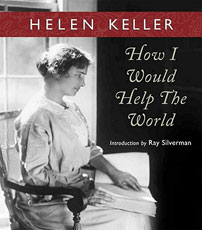"Life in Helen's dark, silent world must have been difficult and discouraging. Helen confesses there were times when she grew weary of groping in the darkness: 'No one knows — no one can know — the bitter denials of limitation better than I do. I am not deceived about my situation. It is not true that I am never sad or rebellious.'
"Helen, however, refused to complain about her situation or allow herself to be imprisoned by dark moods: 'Truly I have looked into the heart of darkness,' she writes, 'and refused to yield to its paralyzing influence. But in spirit I am one of those who walk the morning.' And in another place she writes, 'One can never consent to creep, when one feels an impulse to soar.'
"Helen intuitively knew that there was a larger picture and that her handicaps could somehow serve a worthy purpose in God's greater plan. Therefore, she refused to indulge in self-pity:
" 'Long ago I determined not to complain. The mortally wounded must strive to live out their days for the sake of others. That is what religion is for — to keep the heart brave to fight it out to the end with a smiling face. This may not be a very lofty ambition, but it is a far cry from surrendering to fate. But to get the better of fate, even to this extent, one must have work and the solace of friendship, and an unwavering faith in God's plan of good.'
"She deeply believed that her blindness was part of God's divine plan and that her struggles against limitations would be wondrously transmuted into the gift of hope for others. In this regard, she adds:
" 'Limitations of all kinds are forms of chastening to encourage self-development and true freedom. They are tools put into our hands to hew away the stone and flint that keep hidden our higher gifts. They tear away the blindfold of indifference from our eyes, and we behold the burdens others are carrying, learning to help them by yielding to the compassionate dictates of our hearts.'
"This is a powerful thought: our limitations can be useful. As long as we do not allow them to discourage us, or drive us into self-pity, they can awaken our compassion. They can become a means through which we begin to see and feel the sufferings of others."
